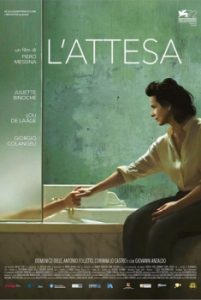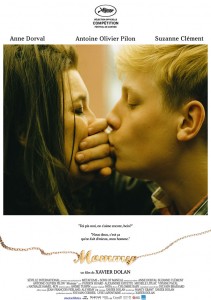For audiences of the mainstream who subsist on the endless supply of samey films that tumble from the Hollywood conveyor belt, European cinema can be an acquired taste. The ponderous way they get their ideas across, the careful, often wonderful cinematography and the glacial pace mean that distribution funds as well as patience usually get tested.
But for those who have developed their filmic palate, the European film scene can deliver some of the finest cinematic offerings currently going around. Look no further than L’Attesa or The Wait, an Italian drama directed by first timer Piero Messina. Staring the ever-exceptional Juliette Binoche, this slow burn Sicilian drama is a showcase of the kind of the slow yet always engaging European cinema which comes to our shores in limited release.
Juliette Binoche, giving one of the finest performances of her career, plays Anna, a divorced woman living in a villa in the magnificent Sicilian countryside who in the opening scenes has tears pouring from her eyes when she attends a funeral. Whose funeral is it is never explicitly stated, but as the film goes on it isn’t difficult to figure out who it was for. In the depths of her grief she receives an unexpected visitor to her home, a twenty-something French girl arrives from Paris for the Easter break. Her name is Jeanne (Lou de Laâge) and she claims to be the girlfriend of Anna’s son who invited her over to Italy to meet his mother. Days pass, Anna’s son doesn’t arrive and complexities arise as secrets and whispers swirl around this Sicilian manor home in the period between Good Friday and Easter Monday.
Performances as a whole are amazing. Oscar winner Binoche’s restrained performance holds the film together but Binoche giving a great performance should go without saying. Instead let’s talk about Lou de Laâge, who entered the project late but manages to stand out in an entire film of great acting. Her round, pale features, thick lips and piercing blue eyes make her a true French beauty. Whatever projects she has in the future, it will be a pleasure to see her career hopefully blossom from here.
Director Piero Messina was an assistant to Paolo Sorrentino while making The Great Beauty and the influence is clear. Slow pacing and ponderous, subtle direction are features the film wears with pride. Like most Sorrentino films, the photography is stunning. Francesco Di Giacomo has done an exceptional job of capturing this magnificent film set in the Sicilian Mountains – which was very close to where Michael’s marriage in The Godfather takes place.
The Wait is actually a fairly apt title, because watching a lot of this film involves waiting. Waiting for the plot to develop, waiting for a character to finally speak after staring into the distance, waiting for the seemingly endless shots of the Sicilian countryside to turn into something else. Yes, this is a slow film; there’s no other way to say it – in the screening I was went to, the gentleman sitting behind me fell asleep about thirty minutes in and was only woken up when his wife elbowed him in the ribs because he was starting to snore. Distracting, but very funny.
But calling a film slow isn’t meant as a negative; slow films often hold the greatest spoils as patience is rewarded with rich and ponderous ideas. The Wait takes its time as it slowly and quietly looks at the minuscule details of Anna’s life. When walking out of the cinema I was reminded of Tinker, Tailor, Soldier, Spy, a film I found an intolerable bore while watching for the first time, but ended up haunting my mind the following week and is a film I now consider one of the best of 2012. But The Wait is not an intolerable bore, quite the opposite, while the pace is as slow as a warm, lazy Sicilian afternoon it has one of richest and most subtly told stories of the year.
Glacial pace European films aren’t for everyone, but for those who enjoy them The Wait is a prime example of Italian cinema with its lavish photography, contemplative nature and richly emotional view of the world.
The Wait is in cinemas from 30th June through Palace Films.





